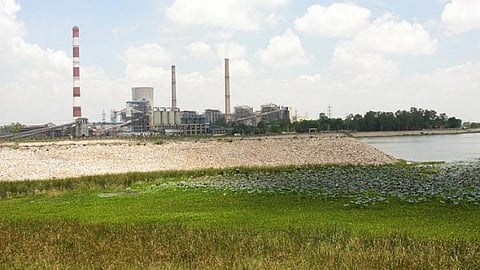
- Topics
- Feature
- Opportunities & Events
- About
- Hindi Portal
- Data
- Topics
- Feature
- Opportunities & Events
- About
- Hindi Portal
- Data

Draft rules call for 100 percent utilisation of fly ash in three to five years
Centre to make it mandatory for coal and lignite based thermal power plants (TPPs) to ensure 100 percent utilisation of fly ash within three to five years. Taking into account utilisation targets from April 1 next year, it is the first time the government has introduced fines on non-compliant plants under the ‘polluter pays principle’. The draft plan calls for a fine of Rs 1,000 per tonne on unutilised ash in case of non-compliance.
The new plan will follow a three-year cycle instead of four-year, as provided in the existing rules, for 100 percent utilisation of fly ash with a grace period of a year in the ‘first compliance’ cycle if the percentage of ash utilisation is between 60-80 percent and two years if it is below 60 percent as accounted during 2021-22. (The Times of India)
State government has no legislative rights to levy cess on industrial use of river water: Kerala HC
The Kerala High Court has set aside the government order passed in 2009 to impose a cess on industries extracting river water for their use. The court brought to notice that the Kerala Irrigation and Water Conservation Act, 2003 entitled the state government to conserve and regulate the use of river water, however; it has no statutory power to impose a tax/cess/fee. The verdict was passed following the writ petitions filed by FACT, Kochi, MRF Limited, Kottayam, and Sree Sakthi Paper Mills, Kochi, against enhancement of cess on river water. (The Hindu)
Three-year project launched for conservation of Kanjli wetland in Punjab
With a focus on the Kanjli wetland in the Kapurthala district of Punjab, Danone India and WWF India have announced a partnership to work together to enhance the ecological integrity of the Kali Bein Conservation Reserve.
Under the project, the organisations will work closely with key government departments, civil society organizations, experts, communities, and industries and develop an integrated management plan for the conservation of Kanjli wetland; a roadmap for restoring (environmental) freshwater flows in Kali Bein river and put in place a multi-stakeholder mechanism for conservation of the wetland.
Kanjli Wetland, a Ramsar site, is a 183-hectare man-made wetland constructed across the Kali Bein river for irrigation in 1870. (Business World)
Himachal’s Dharamshala turns focus to rejuvenate old stepwells in the region
Dharamshala administration has launched ‘Rahiman Paani Rakhiye’ project that is aimed at restoration of 130 stepwells in Dharamshala town and surrounding villages. The move has been taken to prevent acute water crisis in the region in future, as the unprecedented climate change is affecting the glaciers on Dhauladhar mountain range and altering the rainfall patterns.
Under the project, four key factors will be taken care of — hydrological intervention, recharge intervention, storage and regulation. Along with this, the activities to be undertaken during the project involve reserving the source of stepwells, ensuring good connectivity; fencing; separating the bathing area and animal drinking space. (Hindustan Times)
Coastal projects thrive in Tamil Nadu as Centre weakens CRZ norms
In February this year, the Union Environment Ministry had issued a notification that allows projects that violated Coastal Regulation Zone (CRZ) Notification 2011 to get post facto clearance, thereby letting these coastal projects to proceed further without getting prior CRZ clearance.
The notification has opened the backdoor to many violations like the controversial storm water drain project on Chennai’s East Coast Road and the Parakkani check dam on the Thamirabharani river to stop sea water intrusion. Both these projects were violating the CRZ norms and were challenged in the National Green Tribunal, however, the notification has given a breather to these projects.
(Science The Wire)
This is a roundup of important policy matters from April 14 - 27, 2021. Also, read news this week.